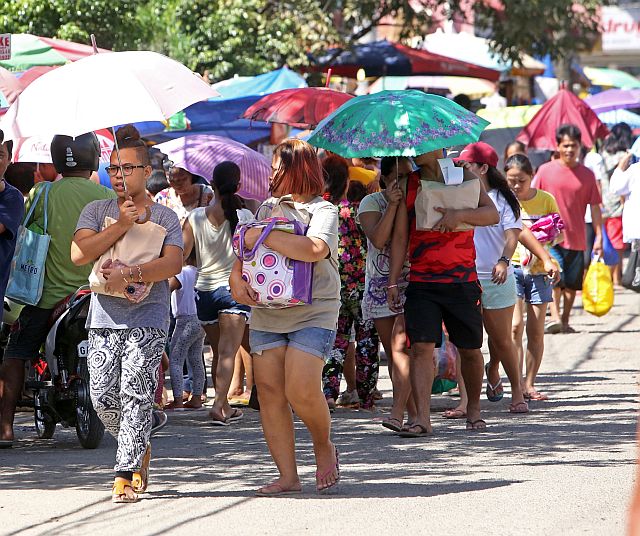
Mandaue City shoppers no longer mind the inconvenience as they have learned to pack their grocery items with either paper or reusable bags as beginning July 2016, the city began to reinforce City Ordinance No. 12-2010-562 better known as the Plastic Bag Ordinance (CDN PHOTO/LITO TECSON).
(CONCLUSION)
Mandauehanons share almost the same sentiments on the reinforcement of Ordinance No. 12-2010-562, better known as the Plastic Bag Ordinance.
Approved on September 29, 2010 under the administration of then city mayor Jonas Cortes, the decree was reinforced last year by now mayor, Gabriel Luis “Luigi” Quisumbing.
It is intended to eliminate the use of plastic bags and polystyrene containers such as styrofoam in all sari-sari stores, eateries, shops, restaurants and shopping malls within the jurisdiction of Mandaue City, as the indiscriminate throwing of these items has been seen to cause the clogging of the city’s drainage system resulting to massive flooding.
It is also a move meant to reduce the large volume of non-biodegradable waste materials that go into the city’s dumpsite located in Barangay Umapad.
While the ordinance has disrupted long-held practices on the use of plastic, many Mandauehanons adhere that safety, sustainability and welfare of the environment are of paramount importance as opposed to some inconveniences.
For Elsa Ytang, 62, a resident of Pagsabungan, paper bags were way too flimsy for heavy grocery items especially canned goods and bottled condiments. But there is always a way to manage, she said.
“Plastic bags would have been more convenient because they are more durable than paper bags,” said Ytang who is still all for the ordinance and now opts to bring her reusable shopping bags to the grocery instead.
Inside a shopping mall in Barangay Centro, Cebu Daily News chanced upon Glicerio Jr., 60, and his wife, Rose Sale, 51, checking out a total of 330 styrofoam boxes which they will use to pack meals for about 300 detainees at the Mandaue City Jail.
The couple said they were aware of the ordinance and its prohibition on the use of styrofoams.
But the mall did not sell paper nor carton boxes as alternatives to the use of plastic and styrofoams.
“If they want to strengthen the ordinance and completely eliminate the use of styrofoams, they must provide alternative options for shoppers,” Rose said.
Even while the Plastic Bag Ordinance banning the use of plastic in Mandaue City has been reinforced, mounds of uncollected garbage, such as this one in Barangay Tipolo, continue to litter parts of the city, causing massive flooding due to clogged waterways. (CDN PHOTO/LITO TECSON)
Leah Mayol, 52, who has been vending Mandaue delicacies for four years, cited that paper bags were inconvenient to use during rainy days.
Nonetheless, she prefers the inconvenience of paper bags rather than suffer the consequences of the use of plastic.
“Maayo ra man sad ni kay at least masolusyonan ang baha. Maanad ra man ang mga tawo ani kadugayan (This is a great way to solve the problem on flooding. Before long, people will be used to the use of paper bags),” Mayol said.
Outlook
By early 2017, the Mandaue City Council will revisit the ordinance, said Councilor Carmelino Del Mar Jr., chairman of the committee on environmental laws.
Among possible amendments to be made in the ordinance would be the adjustment of penalties for violators either by strengthening or relaxing it.
To widen its scope, amendments will also include the specific types of plastics to be banned.
It will go as far as to include the smaller types of plastic wrappers that can most likely block canals and waterways.
Mayor Quisumbing intends to someday fully rid the city of all types of plastics.
But for the meantime, the city government will focus on investing in advanced disposal facilities and teaching residents various means of waste reduction.
“We are strengthening our segregation-at-source efforts so that the volume that reaches the landfill will be much reduced,” said Quisumbing.
“While we are continuing to educate the public on segregation at the household level, what we can do is to make sure that at the barangay level, the clustered Materials Recovery Facility (MRF) will be able to properly segregate any waste we might produce,” the mayor added.
The mayor also announced plans to cluster barangays into five and open one MRF for each cluster.
“Space is one of our biggest challenges in Mandaue and as much as we want to, not every barangay can operate a true MRF facility given the volume of garbage,” Quisumbing said as the city continues to wage its battle against garbage and resulting floods.